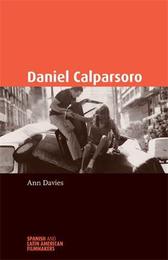
|
Daniel Calparsoro
Hardback
Main Details
| Title |
Daniel Calparsoro
|
| Authors and Contributors |
By (author) Ann Davies
|
| Series | Spanish and Latin-American Filmmakers |
|---|
| Physical Properties |
| Format:Hardback | | Pages:208 | | Dimensions(mm): Height 216,Width 138 |
|
| Category/Genre | Individual film directors and film-makers |
|---|
| ISBN/Barcode |
9780719073649
|
| Classifications | Dewey:791.430233092 |
|---|
| Audience | |
|---|
| Illustrations |
16 black & white illustrations
|
|
Publishing Details |
| Publisher |
Manchester University Press
|
| Imprint |
Manchester University Press
|
| Publication Date |
1 February 2009 |
| Publication Country |
United Kingdom
|
Description
Daniel Calparsoro, a director who has made a crucial contribution to contemporary Spanish and Basque cinema, has provoked strong reactions from the critics. Reductively dismissed as works of crude violence by those lamenting a 'lost golden age' of Spanish filmmaking, Calparsoro's films in fact reveal a more complex interaction with trends and traditions in both Spanish and Hollywood cinema. This book is the first full-length study of the director's work, from his early social-realist films set in the Basque Country to his later forays into the genres of the war and horror. It offers an in-depth film-by-film analysis while simultaneously exploring the director's position in the contemporary Spanish context, the tension between directors and critics and the question of national cinema in an area - the Basque Country - of heightened national and regional sensitivities. -- .
Author Biography
Ann Davies is Chair of Spanish and Latin American Studies at the University of Stirling -- .
Reviews'Ann Davies' monograph on the work of Basque director Daniel Calparsoro is an important contribution to the field. [...] It is in the chapters devoted to close readings of Calparsoro's six films to date where Davies' critical appraisal achieves its best moments, always providing insightful comment and, quite often, delivering excellent detailed analysis that puts the technical descriptions at the service of her general argument.' Jaume Marti-Olivella, Studies in Hispanic Cinemas, 6:1, December 2009 -- .
|